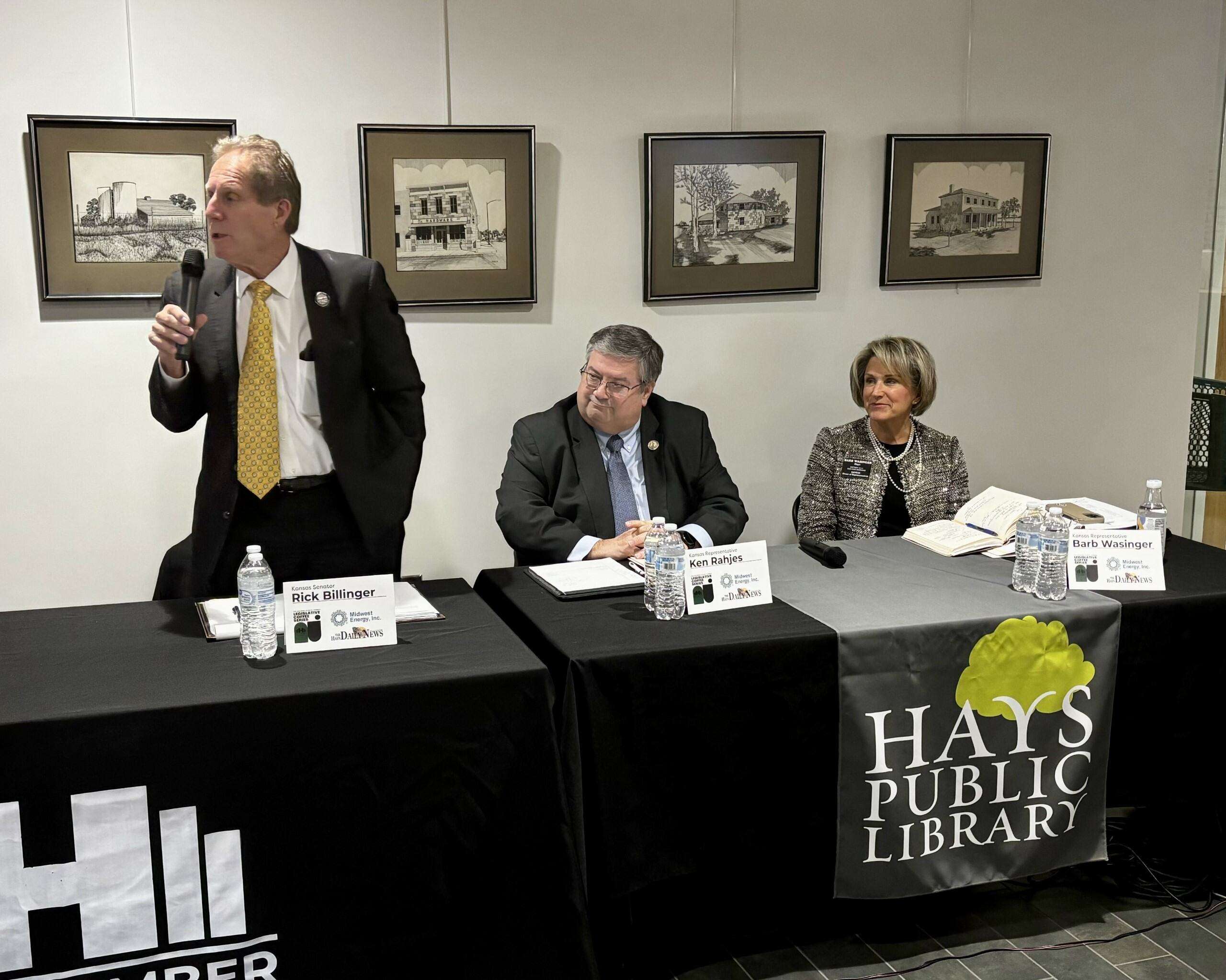
By TONY GUERRERO
Hays Post
Local Republican legislators discussed state spending habits, potential fraud and funding for special education at Saturday's legislative coffee in Hays.
Held at the Hays Public Library, Kansas Sen. Rick Billinger, R-Goodland, Rep. Ken Rahjes, R-Agra, and Rep. Barb Wasinger, R-Hays, spoke to those in attendance.
Government spending
Legislators said Kansas has been overspending and emphasized reducing expenditures to ensure financial stability.
"We have been overspending in the state and we need to stop. We're working very hard to cut things back," Wasinger said.
Billinger said the state spent nearly $1 billion more than it brought in last year due to tax relief programs and budget allocations.
He outlined several tax relief measures that have affected government revenue, including eliminating sales tax on food, social security income tax cuts and property tax relief.
"We're trying to get our trend lines closer together and we're working on that, but there's only so many dollars to go around," Billinger said. "We make tough choices, and we're not going to try to balance the budget on our most vulnerable citizens."
Property tax relief
Billinger said legislators have worked to limit property tax increases and expand homeowner exemptions, including raising the home valuation exemption from $40,000 to $80,000 to reduce the taxable portion of home values.
"In the Senate, we did pass a bill that had a 3% cap on it, so the evaluations could not go up over 3% in one year," Billinger said.
The Astra Plan was created to incentivize counties and cities to keep property tax increases in line with inflation and valuation growth limits. Local governments that comply with these restrictions will receive additional state funding.
"We have to try something different," Wasinger said. "We're trying to encourage and reward those who are staying under CPI (Consumer Price Index) and valuation rate."
The state levies a 1.5-mill property tax for deferred maintenance and schools for blind and deaf students. Billinger said the Senate passed a bill to eliminate this tax, shifting the costs to the state’s general fund.
Medicaid fraud
The Senate Committee on Government Efficiency and a newly formed House committee are examining ways to cut waste and eliminate unnecessary spending.
"We've been asking agencies to report programs that they have and they're not using," Wasinger said.
Wasinger said that the Inspector General for Medicaid uncovered substantial fraud but does not have the enforcement authority to address it.
She said numerous individuals are fraudulently receiving benefits, but state agencies are not taking action to remove them from the system.
"There are a lot of people who are getting benefits but don't deserve benefits," she said.
Wasinger said that records of fraud cases must be requested from the Inspector General. No specific details were given on the amount of money lost to fraud or its frequency.
Special education
Wasinger said that Kansas allocates over half of the state budget to schools and continues to provide them with millions more.
"When people come to the state and want more money, 'We need it for mental health, we need it for this, we need it for that,' we can't do it because our hands are tied right now," she said.
Wasinger said funding allocation reforms are needed to ensure the efficient use of resources, particularly in special education and general school budgets.
Billinger acknowledges that special education funding has not kept up with the growing number of students enrolling in the program.
"I've been on budget for nine years now. We've added money every year, maybe not as much as everyone would hope or I would hope, but we try putting additional money every year," he said.
Billinger said that a larger-than-usual amount was allocated to special education last year and that legislators will try to provide as much funding as possible this year.
Rahjes said that the federal government is expected to provide greater support for special education but has not met its obligations.
He also highlighted the need to fund water and infrastructure projects, positioning education as one of several competing priorities.
"We can spend nine hours talking about every issue in the world, but without water, we're not here," Rahjes.
Rural and agriculture issues
Legislators discussed agriculture's vital role in Kansas' economy and outlined ongoing legislative efforts to support farmers.
"Agriculture and aviation are two of the keys to keeping our economy going," Rahjes said.
Rahjes said that Kansas leads the nation in sorghum production. A $1 million annual investment made to the Center for Sorghum Improvement at Kansas State University is a long-term strategy to develop new products and enhance production.
A new Water Task Force bill was introduced to support long-term water planning and sustainability. At the same time, agritourism legislation is being reviewed to enhance economic opportunities for farms and rural communities.
Billinger said that legislators advocated for higher ethanol blends (E15) to benefit Kansas farmers and ethanol producers, but Gov. Laura Kelly removed Kansas from a multi-state initiative to expand ethanol sales.
"There's not a lot we can do," he said. "One thing you can all do is call the governor and encourage her to support E15."






